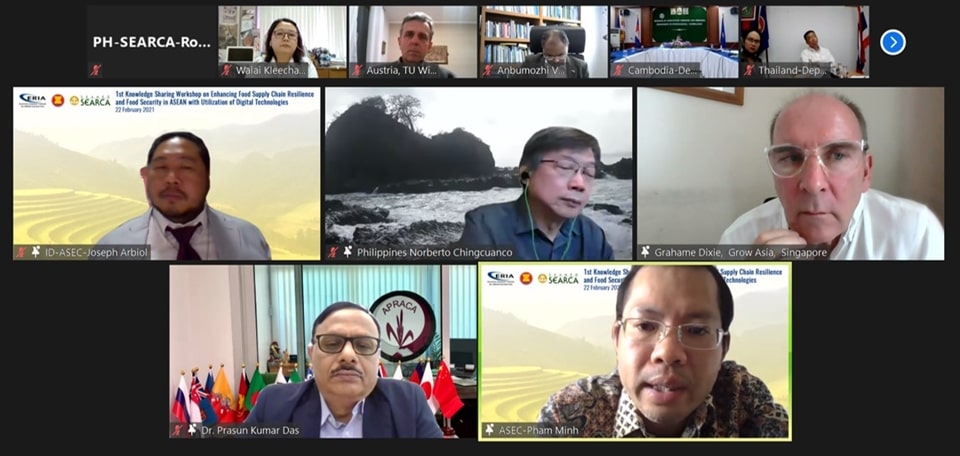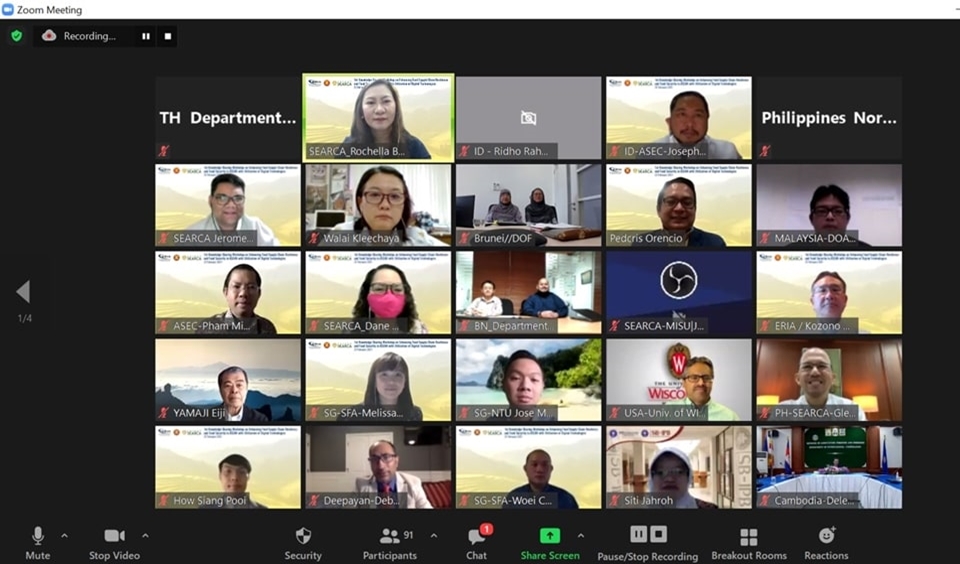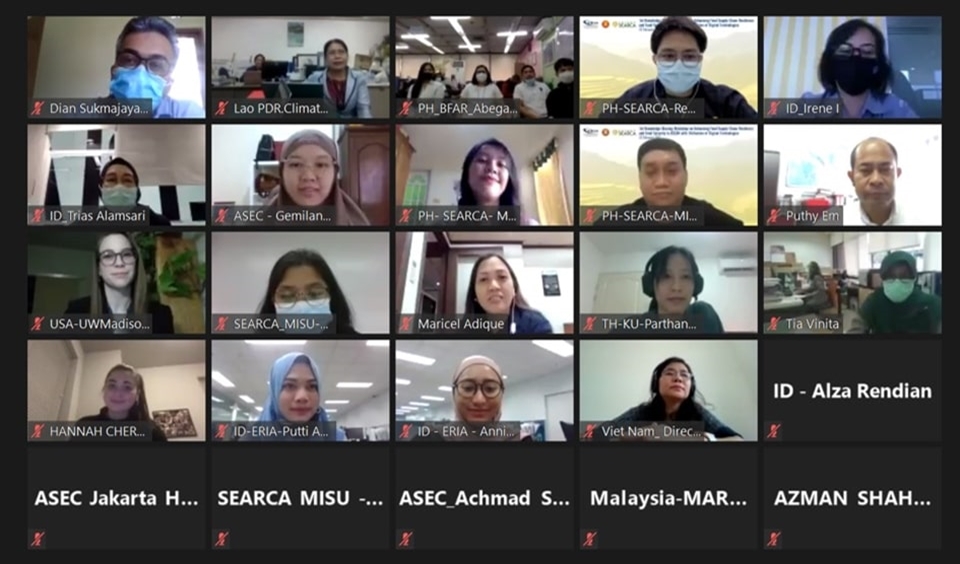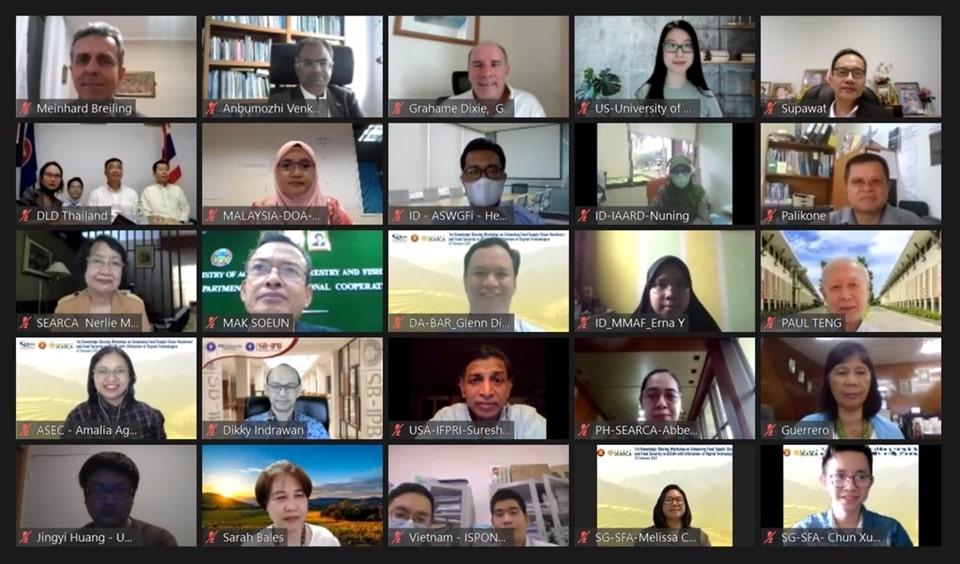Paving the way for a broad digital transformation of agriculture in Asia, SEARCA in partnership with the Association of Southeast Asian Nations (ASEAN) Secretariat (ASEC) and the Economic Research Institute for ASEAN and East Asia (ERIA) held a Knowledge Sharing Workshop for the project on “Enhancing Food Supply Chain Resilience and Food Security in ASEAN with Utilization of Digital Technologies” via Zoom on 22 February 2021. More than a hundred delegates composed of government officials from the agriculture and trade ministries of ASEAN Member States (AMS) as well as representatives from the academe and private sector participated in the activity.
The online workshop was an opportunity to discuss and level-off on the applications, trends, and development of digital technologies in the agricultural sector with AMS, and to gather their inputs and suggestions for developing the ASEAN Guidelines for Accelerating Transformation of Food and Agriculture through Digital Technologies and Innovation. The guidelines aim to equip the ASEAN region with recommendations and implementation considerations for making informed decisions that will shape the digital transformation of agriculture in the region.
In addition, researchers and experts from Nanyang Technological University, Singapore; University of Wisconsin, USA; University of Tokyo, Japan; University of Wein, Austria; University of Missouri, USA; and the International Food Policy Research Institute (IFPRI) gave the participants a deeper appreciation and global insight on the application of digital technologies and related policies worldwide.
 (Top from left) Mr. Joseph Arbiol from the ASEAN Secretariat; Mr. Norberto Chingcuanco from Feedmix Specialist Inc.; Mr. Grahame Dixie of Grow Asia; (Bottom from left) Mr. Prasun Kumar Das from APRACA; and Dr. Pham Quang Minh, Assistant Director and Head, of the ASEAN Secretariat Food, Agriculture, and Forestry Division during the open forum.
(Top from left) Mr. Joseph Arbiol from the ASEAN Secretariat; Mr. Norberto Chingcuanco from Feedmix Specialist Inc.; Mr. Grahame Dixie of Grow Asia; (Bottom from left) Mr. Prasun Kumar Das from APRACA; and Dr. Pham Quang Minh, Assistant Director and Head, of the ASEAN Secretariat Food, Agriculture, and Forestry Division during the open forum.
Members of the private sector also shared their perspectives and experiences in using digital technologies. On fisheries, Mr. Norberto Chingcuanco, Vice President-Corporate Planning of Feedmix Specialist Inc., emphasized the need to digitalize the sector to improve traceability, biosecurity, worker safety and monitoring, and efficiency of feeding and handling. Representing the smallholder agriculture and food value chain sector, Mr. Grahame Dixie, Executive Director of Grow Asia, shared how digital technologies offer great potential to transform trading relationships between smallholder farmers and agribusinesses. Dr. Prasun Kumar Das, Secretary General of the Asia Pacific Rural and Agricultural Credit (APRACA), also shared their experiences on available digital financial services to support food supply chain. A huge percentage of the population in ASEAN still lack access to basic financial services, but these issues can be addressed by possible interventions such as financial inclusion, smallholder financing, and financing downstream value chains.
The participants were then divided into smaller groups to discuss the status of digital technologies in their respective countries. Their main reason for using digital technologies for agriculture is enhanced efficiency, particularly in enhancing traceability, easing up operations, providing market linkages, improving licensing processes, and selling of products through e-commerce tools. However, while new or younger users see digital technologies as helpful and exciting, they can be challenging to the older ones. These technologies need adaptive features to accommodate the needs of new and aging users. They cited that having an enabling environment through policy formulation is instrumental to improve digital technologies in the food and agriculture sector. Investments must also be in place to build infrastructureas well as improve the accessibility, availability, and affordability of technologies.
Towards the end of the workshop, SEARCA Director Dr. Glenn B. Gregorio underscored how digitalization is an important facet of SEARCA’s 11th Five-Year Plan, specifically in accelerating transformation through agricultural innovation, to ensure that farmers become business-minded and turn into agripreneurs )and eventually become agripreneurs who are users of modern technologies or ‘transfarmers’.
“SEARCA is also working to promote youth-readiness on smart agriculture. We aim to increase the level of investment in the rural sector from a business-as-usual strategy to a better, bigger and smarter approach that will impact the lives of farmers and their families,” Dr. Gregorio said.
The outputs of this workshop along with an initial draft of the ASEAN Guidelines will then be presented at the meeting of the ASEAN Technical Working Group on Agricultural Research and Development (ATWGARD) in April 2021. A second workshop will be convened to gather further inputs from the AMSs and the ASEAN working groups on crops, livestock, fisheries, and forestry before submitting the document to the special Senior Officials' Meeting of the ASEAN Ministers on Agriculture and Forestry (SOM-AMAF) in August 2021 .


